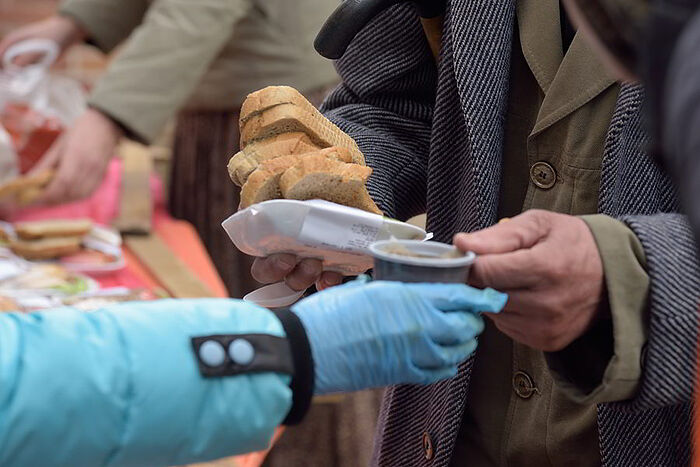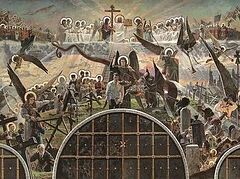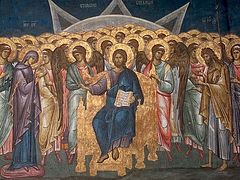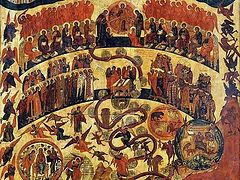I am sure that we have all had many interactions with other people that have helped us to see ourselves a bit more clearly than we had previously. Sometimes we have learned about our strengths and abilities that way, but other times we have gained insight into our weaknesses and failings. Such encounters with our neighbors have this revelatory power because we encounter the Lord through them. Encountering Him always reveals the truth about our souls, for He is the Light Who illumines even the darkest crevices of our character. And we do not then always like what we see.
On this Sunday of the Last Judgment, the Church calls us to consider how every encounter with those who bear God’s image is an encounter with Christ that anticipates the ultimate judgment, which will reveal whether we have come to share in His eternal life. As we begin the last week before Great Lent, the Savior reminds us in today’s gospel reading that how we relate to our neighbors, especially those we are inclined to overlook, disregard, and even despise, is the great test of our souls. How we treat the hungry and thirsty, the stranger and the naked, the sick and the prisoner, manifests whether we serve a Kingdom not of this world in which the last shall be first or whether we have become conformed to corruption. There is simply no way around the truth that how we relate to our suffering and inconvenient neighbors, whoever they are, is how we relate to our Lord.
That is the case because whether we truly participate in His life is shown by whether His love and mercy are evident in us. If we truly participate in Him, the Lord’s virtues will become our virtues, for He has worked the fulfillment of the human person in the image and likeness of God. And what is more characteristic of Christ than His self-emptying love for all who suffer the degrading consequences of sin, which lead ultimately to the despair of the grave? By offering Himself fully on the Cross, the God-Man has set us free from bondage to corruption and has united us to Himself as members of His Body, the Church. The crucified and risen Lord enables us to participate by grace in the eternal communion of love shared by the Holy Trinity. The ultimate test of our souls is whether we have united ourselves to Christ such that His love permeates every dimension of who we are to the point that we treat our neighbors as He treats us.
Whether in Lent or any other time of the year, it is impossible to impress God by being extremely religious or trying to earn a reward by doing enough good deeds of any kind. Our calling, instead, is humbly to embrace His healing to the point that we radiate His selfless love to other people. The more our character conforms to His, the more we will spontaneously offer ourselves to build relationships of love with our neighbors. To do so means that we will be able to say truthfully, “I no longer live, but Christ lives in me.” (Gal. 2:20)
On this last day for consuming meat until Pascha, we read St. Paul’s teaching that the key issue in the question of whether to eat meat that had been sacrificed in pagan temples in first-century Corinth was how doing so impacted others, for “food will not commend us to God. We are no worse off if we do not eat, and no better off if we do. Only take care, lest this liberty of yours somehow become a stumbling block to the weak.” To cause another to fall back into paganism would be to “sin against Christ.” His words show that what is truly at stake in fasting is not a mere change in diet or the fulfillment of a religious obligation, but relating to food in a way that helps us acquire the spiritual strength to love and serve our neighbors. By abstaining from the richest and most satisfying dishes, we learn to reorient our desires from self-gratification toward serving others. Eating a humble diet frees up resources to give to the needy in whom we encounter Christ, such as the victims of the earthquakes in Turkey and Syria and of the war in Ukraine. Lenten foods should be simple and keep well for future meals, thus freeing up time and energy for prayer, spiritual reading, and helping and otherwise building wholesome relationships with our neighbors. Fasting helps us gain a measure of freedom from slavery to our passions as we learn that we really can live without getting exactly what we want or satisfying every desire. Contrary to how we have been formed in our consumeristic culture, it will not kill us to take small steps in serving God and neighbor instead of ourselves.
The spiritual discipline of fasting is simply a tool for shifting the focus away from ourselves and toward the Lord and our brothers and sisters in whom we encounter Him each day. If we distort fasting into a private religious accomplishment to prove how holy we are, we would do better not to fast at all. Doing that is simply a distraction from fulfilling the true purpose of the coming season. It is the vain effort of trying to serve ourselves instead of God and those who bear His image and likeness. In Lent, our focus must be set squarely on Christ and His living icons, not on us. The fundamental calling of the Christian life is to become like our Lord, Who offered Himself up for the salvation of the world purely out of love. If we want to approach Lent in a spiritually healthy way that will enable us to participate more fully in Him, then we too must offer up ourselves for our neighbors. Whether we do so will reveal whether we are truly in Christ.
The particular form of that self-offering will vary according to the needs of the people we encounter and our gifts, callings, and life circumstances. Discerning how to live faithfully is not a matter of cold-blooded rational calculation, but of being so conformed to Christ that we become a “living sacrifice” (Rom. 12:1) such that the Savior’s healing of fallen humanity becomes present, active, and effective in us. Instead of living as isolated individuals who define themselves over against one another in an endless cycle of competition and grievance in a pathetic effort to distract ourselves from the inevitability of the grave, we must grow as persons in communion with Christ and all those who bear His image and likeness. His eternal life will truly become ours as we unite ourselves more fully to His great Self-Offering on the Cross for the salvation of the world.
According to today’s gospel reading, this alone is the true path to the eternal life of the Kingdom. Whether we pursue it will determine if we have the spiritual clarity to behold the glory of the Lord as joyful, brilliant light or instead become so blind that we perceive only the burning torment of our own refusal to be transformed by His love. The difference between the sheep and the goats on the last day is not in our Lord, but in how we have responded to Him. His eternal judgment will identify the truth about our souls and reveal clearly and definitively who we have become.
Whenever we encounter the Lord in our neighbors, there is inevitably a kind of judgment that reveals our character. That is the case when we see His living icons suffering today as the victims of terrible earthquakes and wars. It is the case when those who bear His image are sick, lonely, hungry, or in any other circumstance in which they need our attention, care, and support. Since we are not yet those who respond generously to all our neighbors without a second thought, we must mindfully struggle against our self-centeredness and indifference to the sufferings of others. In order to do that, we must not shut the eyes of our souls to the brilliant light of Christ when the darkness within us becomes all the more apparent. We must respond to what every judgment of our souls reveals by taking the steps we can to open and offer our hearts to Christ more fully so that we will become more beautiful living icons of His restoration and fulfillment of the human person in the divine image and likeness. In order to do that, we must persistently refuse to fuel our passions with self-indulgence as we fast and humble ourselves while calling out for the Lord’s healing mercy from the depths of our hearts.
If we stay on this path throughout the remaining time of our life, and return to it whenever we stray, then we will have good hope of being among those surprised to hear at the Last Judgment, “’Come, O blessed of my Father, inherit the kingdom prepared for you from the foundation of the world.’” Like the people on His right hand in the parable, that will not be because we have calculated rationally how to earn a prize or think that we deserve a reward, but because the self-emptying love and gracious mercy of Christ have permeated our souls and become constitutive of our character. Every day of Lent, and every day of our lives, let us entrust ourselves to Him as we live according to the standard of the Last Judgment: “‘Truly, I say to you, as you did it to one of the least of these My brethren, you did it to Me.’”





